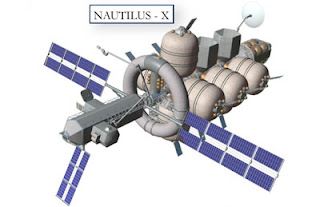"Access To Space"
Andre Bormanis has an article over at The Space Review which includes this nugget:
Oh, is that what "access to space" means?
Well, as someone who is outside the US, I feel I can safely say: no-one cares. Yes, "soft power" exists, but no-one knows the names of astronauts anymore - they're just government employees who go up to an incomprehensible space station to pretend they're doing Important Work that has no real world implications.
Think about it, Russia has been consistently launching humans into space since the 60s with no gaps in their program, does anyone actually think of Russia as somehow being "powerful" because of this? No, we all think of Russia as a "declining power" because they suck at trade and foreign affairs and can't control their criminal population.
There is no sensible argument that can turn human spaceflight into a national security issue. No-one is going to invade the US because a spaceflight gap makes them look weak. ICBM technology is not driven by human spaceflight and it's arguable whether it ever was - and it's getting harder and harder to make any argument that nuclear armageddon is relevant to US national security in any case.
The closest thing to a logical argument ever presented for why human spaceflight is relevant to national security is that it inspires kids to go to college and do engineering which is of some value to the DoD (or something like that). This argument has been dismantled plenty of times. Penn and Teller even had a go, showing that kids really don't care, even when the entire day's activities involves crawling around inside a Space Shuttle simulator.
There's much better ways to inspire kids to enroll in engineering classes (and it should be obvious that by "kids" don't mean 10 year olds), like actually paying engineers more, describing how its a rewarding career (really, not sugarcoated NASA nonsense), and just showcasing how rich you can get if you're actually good at it and have some entrepreneurial drive.
The US frequently partners with other countries and international organizations on space missions, primarily in the field of robotic exploration. Partnering in the development of manned systems has been resisted because of a belief, held deeply by many in government and among the public, that the US needs to have independent human access to space to maintain its status as a world power. If the Russians and Chinese can send people into orbit, so the reasoning goes, the US must as well, or risk being perceived as a declining power on the world stage.
Oh, is that what "access to space" means?
Well, as someone who is outside the US, I feel I can safely say: no-one cares. Yes, "soft power" exists, but no-one knows the names of astronauts anymore - they're just government employees who go up to an incomprehensible space station to pretend they're doing Important Work that has no real world implications.
Think about it, Russia has been consistently launching humans into space since the 60s with no gaps in their program, does anyone actually think of Russia as somehow being "powerful" because of this? No, we all think of Russia as a "declining power" because they suck at trade and foreign affairs and can't control their criminal population.
There is no sensible argument that can turn human spaceflight into a national security issue. No-one is going to invade the US because a spaceflight gap makes them look weak. ICBM technology is not driven by human spaceflight and it's arguable whether it ever was - and it's getting harder and harder to make any argument that nuclear armageddon is relevant to US national security in any case.
The closest thing to a logical argument ever presented for why human spaceflight is relevant to national security is that it inspires kids to go to college and do engineering which is of some value to the DoD (or something like that). This argument has been dismantled plenty of times. Penn and Teller even had a go, showing that kids really don't care, even when the entire day's activities involves crawling around inside a Space Shuttle simulator.
There's much better ways to inspire kids to enroll in engineering classes (and it should be obvious that by "kids" don't mean 10 year olds), like actually paying engineers more, describing how its a rewarding career (really, not sugarcoated NASA nonsense), and just showcasing how rich you can get if you're actually good at it and have some entrepreneurial drive.


What ever happened to EXPLORATION? Has mankind lost the drive for that too? Space is mans greatest exploratory adventure. The Universe awaits!
ReplyDeleteDennis, can you rephrase exploration as a reason? The best I've ever heard is people who say "I think we need to explore because civilizations that stop exploring eventually fade out". I *guess* there's some wisdom in there, but I'm not sure exactly what it is.
ReplyDelete